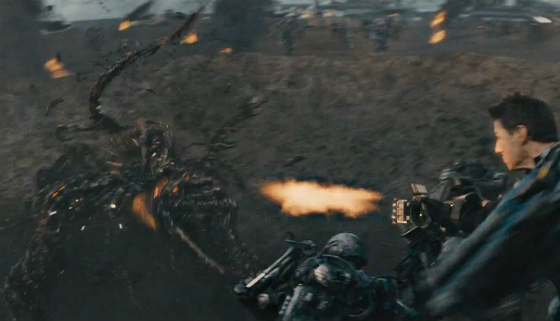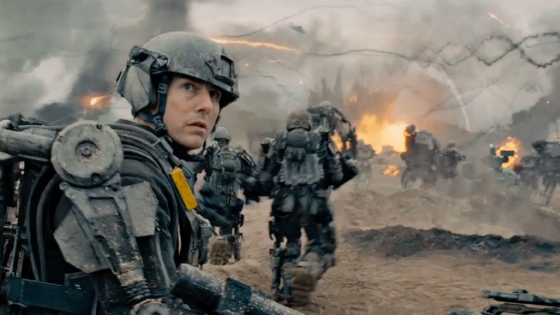TR Review: Tom Cruise’s Life Is a Hard NES Game in Edge of Tomorrow
 |
| trailer screencap by scifiempire.net |
Dear fictional military leaders of future wars,
In real life, most of the military guys I know read or have read sci-fi novels. Classics you may have heard of, like Starship Troopers or Ender’s Game (there were also movie versions that you’d likely know about if you truly resembled real human beings). There’s a popular concept in many of these books that you might want to consider if aliens actually invade your fictional future world. It involves the fact that if all the aliens look basically the same and act as one, it’s because they are a collective. Fuck, all you’d have to see is the movie Aliens to imagine that aliens might have a queen. At the very least, it should not come as a mind-blowing shock that you never considered, until an unlikely hero explains it to you with the caveat that you’re going to find it hard to believe.
[Readers, this is really a pretty minor spoiler, as they go. Don’t freak out. You, unlike fictional General Mad-Eye Moody in Edge of Tomorrow, are well aware of the canon and will see that part coming.]
 |
Anyway, moving on – Edge of Tomorrow, based on the Japanese young-adult novel All You Need Is Kill, takes great pains to establish how our world today becomes the futurescape we end up watching, via tedious media montages (it’s something that the upcoming Snowpiercer also does, to its detriment). Honestly, this is unnecessary – if a future world is solid enough in its own rules, we’ll believe it without having to know everything. Showing Tom Cruise as Major William Cage appearing on Jake Tapper’s show doesn’t make me believe “William Cage” is any more or less real as a character – how Cruise plays him as a character will define that. Incidentally, while it’d be nice to believe Cruise is taking on the name of fellow action hero Nicolas, it’s more likely due to the fact that it’s close to “Keiji,” the original protagonist’s name.
Cruise for once deliberately plays a smarmy a-hole whose rank is honorary – he has never seen any combat, and serves mostly PR purposes, maintaining his position as an implied benefit of the merging of corporate and military power. Assigned to broadcast from the front lines of a next-gen D-day invasion of alien-occupied Europe, he declines – first politely, then not – and finds himself arrested for desertion, demoted, and sent to the front lines as a private, where he’s shortly face-to-face with alien “Mimics,” whose name is a bit weird; swirling masses of tentacles, they seem only to be mimicking the Sentinels from The Matrix if anything. One of them kills Cage and melts his face, but then he promptly wakes up at the beginning of the day again. Going through the same paces, he makes it a little bit further, then dies again. And re-awakens again. And this cycle keeps going.
Groundhog Day seems like the obvious point of reference, but anyone reading this will probably be reminded more of the days of difficult Nintendo platforming games, where each time, you make it one step closer to the end of the stage, then hit a jump wrong, die and have to start the whole level again just to get back to that same point and try something different. Eventually Cage figures out that the key to surviving may lie in finding war hero Rita Vrataski (Emily Blunt), who meets him on the battlefield and seems to know what is happening to him. She, on the other hand, sees in him a potential way to end the war – with him living the same day over and over, he has limitless time to train to actually be not just a decent soldier, but the best.
The action here is solid, with enough of a hook to keep you involved – for big, loud summer entertainment, it does the job without being too annoying or insulting. As in Godzilla, the powers of the monstrous foes are presented as a fait accompli without much explanation, which is as it should be: why do they have the powers they do? They just do. Accept and move on. On the other hand, the aforementioned annoying news montage that explains how the exo-suits make it easy for anyone to be a soldier and beat the Mimics is needless, and wrong – the movie’s own events, which see Cage die pretty damn quickly in one the first time, contradict this. It would also be nice to know a little more about how the Mimics operate – are they attracted to heat? Sound? Movement? Why do some things kill them more easily than others? This is knowledge our characters have that they ought to share with us.
Oh, and about that scene with Tom Cruise on a motorcycle that he conjures from nowhere: I get that Cruise apparently has it in his contract that he must be on a motorcycle at least once a movie, but could it not have been integrated into the plot better?
 |
Ironically, when the unlimited lives eventually run out and Cage is (knowingly) on his last one, the suspense dissipates, rather than amping up as it should. Instead of wondering how he’ll die next, all we can think is “Tom Cruise won’t die any time before the very last scene, if indeed he must die at all.” So it makes things from then on feel more like obligatory steps than hurdles to overcome, somehow.
While my colleague Amy Nicholson recently wrote an article to the effect that Cruise no longer makes interesting choices, I have to say I’m happy he uses his star clout to make character-based sci-fi movies (I’m happy Will Smith does too, even if nobody else liked After Earth). A cynic could see it differently. It’s none too hard to look at a movie in which Cruise is playing an eternally recurring soul, using the power of his mind and memory of his past life to expand his capacity as a human being, unlocking his full potential after endless cycles of repetitive exercises, and think, “Hmmmm…this reminds me of something.”
Likewise, a cynic could complain about the gender-switch involving Rita’s mechanic, who was female in the book and Noah Taylor in the movie. Did director Doug Liman feel that one strong woman was enough? (There is a secondary female soldier character, but she is given nothing to do). Rita is a great character who kicks ass but isn’t defined by ass-kicking, shown as superior to Cage in pretty much every way save for his time-jumping. And Bill Paxton’s pretty damn funny as the Sergeant – it’s like Hudson grew up and grew a pair, but kept a sense of humor about his past self.
These, however, are all things you think about after the movie – it’s propulsive enough that you really don’t care during, and pretty much the definition of a popcorn flick. Unlike many of the year’s big-bang movies so far, it probably won’t linger long in the memory. But then, not being any part of a larger franchise, it doesn’t need to.
